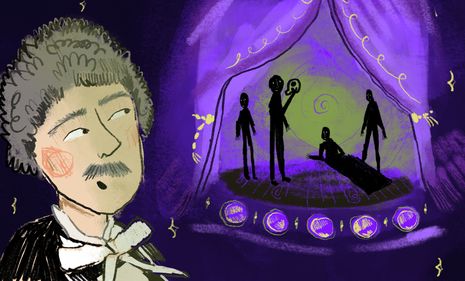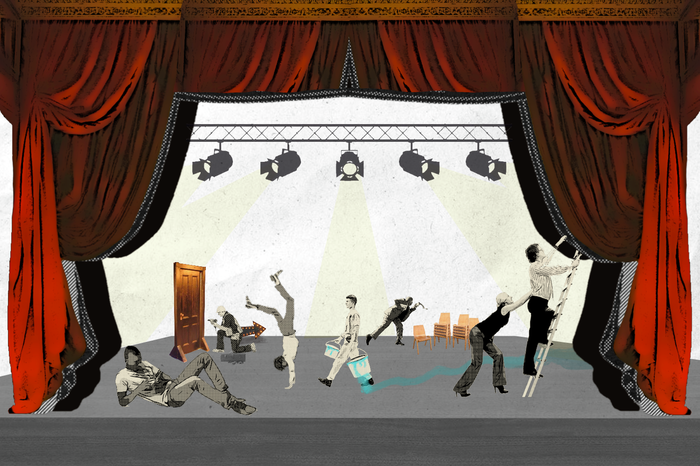The challenges facing postgraduates in Cambridge theatre
Shan Tan-Ya sits down with three MPhil students to discuss their experiences in Cambridge theatre

Graduate students, or ‘postgrads,’ exist in an odd limbo at Cambridge: we make up half of the student population, but are much less present in student societies. In contrast to the milestones that mark and unify the undergraduate years – supervisions, mocks, revision, exams – there is no defining ‘graduate experience.’ We have MPhils cramming a lifetime of Cambridge experiences into a single year, PhDs who only emerge from the lab to visit the library, and MBAs running their own start-ups between lectures, all at different stages of their lives and careers. Some, however, do have something in common – a passion for theatre. I interviewed three MPhil students to find out more about their experiences, both positive and negative, with the Cambridge theatre scene as graduate students
“Gaining the confidence to pitch your own shows takes time which one-year MPhils usually don’t have”
Something I had wondered was how much of a minority graduates were in theatre. Tina, who has tried everything from producing to tech in her year at Cambridge, explained that it varies from show-to-show, but that there are often more than you might expect. In one of her recent shows, five out of 11 cast members and five crew members were graduates, including three PhD actors. Nora, who acted in The Gilbert and Sullivan Society’s production of Patience, highlighted the group’s more varied demographic compared to other theatre societies – more people who take part tend to stay in Cambridge following their undergraduate course. As a result, their shows contain a varied mix of MPhils, PhDs, and even alumni.
However, Tina senses a notable drop-off in graduate participation when it comes to higher-commitment roles like directors, producers, and backstage techies. A large factor is the timeline: “I found myself facing graduation after I just became acquainted with Cambridge theatre,” and the packed schedule of the MPhil course. Practicing tech skills and gaining the confidence to pitch your own shows takes time which one-year MPhils usually don’t have. Combine that with the challenge of adjusting to theatrical norms in a new culture (Nora is from the US), or even a language outside of your mother tongue (Tina’s undergraduate was in Beijing), and it’s even more impressive how involved some MPhils manage to be.
“It felt like everyone else had shared experiences that I lacked”
Even then, there can also be social challenges that accompany these differences in life experience. Even as a younger graduate, aged 22, Nora found it hard to make friends on shows and connect with conversations revolving around club nights and weekly essays: “the undergrad experience is so different from the postgrad one. It felt like everyone else had shared experiences that I lacked.” Rose, who spent a year working as a professional English and theatre teacher, felt as if she were: “babysitting rather than participating” in a Michaelmas Fresher’s show due to the age difference and chaos.
In addition, graduates face different academic expectations which can affect their theatrical involvement. Tina’s supervisor warned her that her involvement in theatre could: “get in the way of serious academic research”. Rose advises that directors should be aware that graduates have very different schedules to undergraduates. These may permit more time for rehearsals, but on the other hand, it may result in less capacity to reschedule fixed appointments at a short notice.
“Is chaos the price for creative freedom? Is originality incompatible with accountability?”
A major frustration is shared over how difficult it is to navigate the various Cambridge theatre networks. As an American student unfamiliar with the college system, Rose describes struggling to sort through the various theatre and audition opportunities from every college alongside the ADC. Nora suggests this as a possible reason for the lower graduate involvement in theatre: “I wonder if a lot of postgrads just aren’t as aware of where to look. It took me a while to figure out what CamDram [the online student database for Cambridge theatre] was and how to use it to find upcoming productions.” Tina found CamDram helpful but similarly experienced poor communication from college theatre.
I asked the interviewees, who all studied their undergraduate elsewhere, what surprised them most about Cambridge theatre. Tina praised Cambridge’s sophisticated system of tech training, making it a more inclusive discipline to enter. Nora noted the: “lack of standardisation” between the many groups, in contrast to her stricter undergraduate theatre society which kept productions running smoothly and held teams “accountable,” even if this impacted creativity. Rose critiqued the: “severe lack of leadership and guidance from [the] ADC,” but appreciated the wealth of opportunities available. The phrase “both a blessing and a curse” came up several times, making me wonder why these trade-offs are necessary. Is chaos the price for creative freedom? Is originality incompatible with “accountability?”
I think not. Cambridge theatre may be a tangled ecosystem, but it is constantly evolving to become more inclusive and efficient. Graduates are part of the reason for that – with their outsider perspective and broader points of reference, they have insights into what may be missing, as well as how to improve what works. Understanding and addressing their challenges is an important step towards ensuring we continue to learn from everyone we can.
 News / Right-wing billionaire Peter Thiel gives ‘antichrist’ lecture in Cambridge6 February 2026
News / Right-wing billionaire Peter Thiel gives ‘antichrist’ lecture in Cambridge6 February 2026 Features / From fresher to finalist: how have you evolved at Cambridge?10 February 2026
Features / From fresher to finalist: how have you evolved at Cambridge?10 February 2026 Film & TV / Remembering Rob Reiner 11 February 2026
Film & TV / Remembering Rob Reiner 11 February 2026 News / Churchill plans for new Archives Centre building10 February 2026
News / Churchill plans for new Archives Centre building10 February 2026 News / Epstein contacted Cambridge academics about research funding6 February 2026
News / Epstein contacted Cambridge academics about research funding6 February 2026










